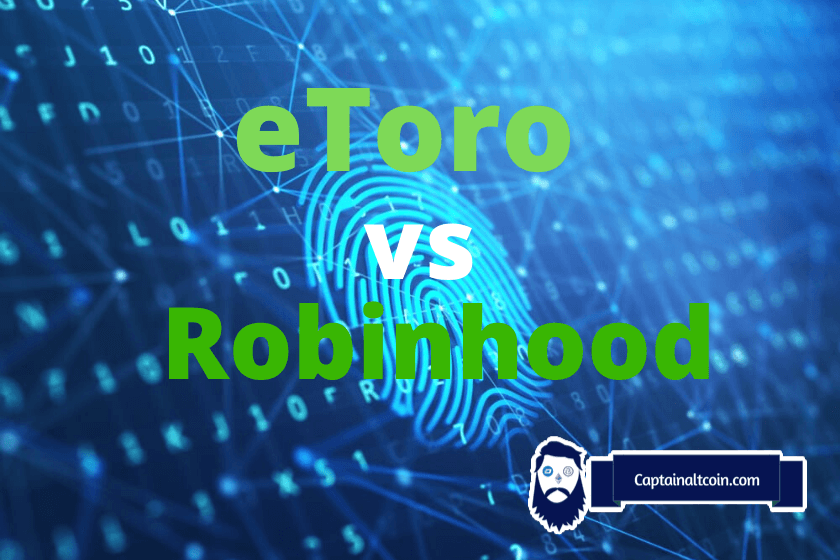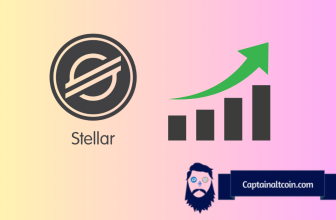
Both eToro and Robinhood climbed the ladder of popularity in crypto circles as they announced addition of cryptocurrencies to their platforms.
Even though both fintech startups are known for their forex, ETF and trading of other financial derivatives, we will focus primarily on their cryptocurrency divisions and what they have to offer.
To keep the introduction of eToro vs Robinhood comparison as short as needed, here is how the duel went down.
eToro is a multi-asset platform which offers both investing in stocks and cryptoassets, as well as trading CFDs.
Please note that CFDs are complex instruments and come with a high risk of losing money rapidly due to leverage. 61% of retail investor accounts lose money when trading CFDs with this provider. You should consider whether you understand how CFDs work, and whether you can afford to take the high risk of losing your money.
This communication is intended for information and educational purposes only and should not be considered investment advice or investment recommendation. Past performance is not an indication of future results.
Copy Trading does not amount to investment advice. The value of your investments may go up or down. Your capital is at risk.
Cryptoasset investing is highly volatile and unregulated in some EU countries. No consumer protection. Tax on profits may apply.
Don’t invest unless you’re prepared to lose all the money you invest. This is a high-risk investment and you should not expect to be protected if something goes wrong. Take 2 mins to learn more
eToro USA LLC does not offer CFDs and makes no representation and assumes no liability as to the accuracy or completeness of the content of this publication, which has been prepared by our partner utilizing publicly available non-entity specific information about eToro.
What you'll learn 👉
eToro vs Robinhood: General info
Since its launch in 2006, eToro has become a multinational sensation and is now active in over 140 countries.
eToro is a well established financial platform offering a wide range of financial trading services. They have expanded their offering to include crypto currencies with some unique benefits such as fee-less trading and margin trading. It is also one of the rare services where you can buy crypto with PayPal. Credit Cards and PayPal are not available for deposits to the eToro balance of users under the FCA regulation.
One important note: eToro sells you both CFDs or actual coins. With CFDs, it allows you to speculate on their price by giving you IOUs instead of real coin. So in that case, if you want to withdraw bitcoin from eToro, you need to sell it for fiat currency, withdraw that fiat money and go to some other crypto exchange to buy “the real bitcoin”. If you choose to buy actual coins, then same rules of withdrawal apply like with any other exchange.
Robinhood, which is self-dubbed as a new, disruptive force in the online brokerage industry, launched to the public in 2014 exclusively as a mobile app for Apple smartphones and tablets. Robinhood’s target audience are millenials with commission-free trading as a major selling point. In 2019, they added support for cryptocurrencies as well.
Important note: You do not own the coins you trade on Robinhood – Robinhood essentially issues IOUs that act as coin replacements (hence no fees). This means you can’t send coins out of this exchange to your own wallet.
Robin hood vs eToro: Fees
Although eToro does not charge any fees for opening or closing trades, it does charge a spread that varies depending on the instrument, e.g. 0.75% for Bitcoin (BTC) and up to 3.45% for certain trading pairs, such as ZEC/ZHF.
In addition to this eToro charges a flat $5 payout fee while deposits are free (conversion fees apply).
Robinhood is one of the rare exchanges that charges no fees for trading. They have made their name in the world of stocks by offering no-fee investing, and this is the model they replicated to their crypto offering. But there is a catch, so keep on reading.
Robinhood charges no visible fees but trading on their platform is far from being free. It can actually end up costing you more than to trade on exchanges where you know what trading fees are charged. Robinhood makes money by earning interest on uninvested cash in customer accounts and they also receive income from payment for order flow, according to a statement issued by Vlad Tenev, the firm’s co-CEO and co-founder, on October 12, 2018. Robinhood’s order execution engine does not seek out price improvement opportunities, which is something investors who trade large lots of 500 shares or more look for in a broker. An order that is price improved either finds a lot to buy at a slightly lower price than the customer’s limit order, or a higher price when selling.
Buying Limits
There are no upper limits how much you can buy but there is a minimum deposit amount you need to put in on eToro. You must have $200 to participate in CopyTrading and make a minimum investment of $1,000 for CopyPortfolios. The minimum quantities for manual positions are based on the instrument. For currencies (such as cryptocurrencies) and commodities, it is just $25 (or $50 if you are in the US). For stocks, it is $50. Finally, for ETFs and indices, it is $1000.
The instant deposit function has some limitations: if you have a Robinhood Standard account, you can deposit up to $1,000 instantly, while the limit at the Robinhood Gold account is $50,000. All transfers above the limit will be credited only after 4 to 5 business days.
Deposit and Withdrawal methods
Among crypto currency platforms, eToro stands out as one of the few platforms. Other deposit and withdrawal options include: wire transfer (Swift and SEPA), Giropay, Skrill, Neteller.
Robinhood supports an instant deposit via ACH transfer. You’ll receive up to $1,000 in instant deposits by the exchange while the actual settlement takes part – time for any deposit larger than $1,000 will be up to five business days.
You can withdraw up to $50,000 per business day from Robinhood.
The only option is ACH transfer from your Robinhood app to your bank account but in case you just made a sale, your funds need to “settle” before you can withdraw them to your bank account. That settlement period equals three days – the trade date plus two trading days (T+2). On the third day, those funds will be eligible for withdrawal to your bank account.
Supported Countries
eToro is available in the majority of the globe, with the exemption of Canada, Cuba, Japan, North Korea, Iran, Syria, Turkey, Serbia, Albania, and Sudan.
Robinhood crypto trading is curently only available in California, Massachusetts, Missouri, Montana, and New Hampshire.
Supported coins
As a multi-asset brokerage, eToro allows users to trade thousands of financial instruments, including over a dozen crypto currencies (all major coins such as Bitcoin, ETH, XRP, IOTA, EOS, XLM, ADA, EOS etc). Based on the concept of social trading, eToro is designed to be suitable for both new and experienced traders.
Robinhood currently supports Bitcoin, Bitcoin Cash, Bitcoin SV, Dogecoin, Ethereum, Ethereum Classic, Litecoin.
Customer Support
eToro has a thorough help center that provides basic information about trading as well as answers to the most common user problems. In addition, eToro only offers a simple ticket system for the majority of its user complaints and the answers are often slow. Beyond the traditional support lines, eToro also answers customer queries via social media. As a beginner-friendly platform, eToro also offers a variety of training materials and customer support for users, ensuring that help is at hand when it’s needed.
Like many other crypto exchanges, phone support is just a vain hope – you won’t find it here — Robinhood’s customer support is almost entirely done through email. The company does not publish a phone number. It does have a useful and well-organized knowledgebase and help center section, and the website is easy to navigate and transparent.
Trust and reputation
As a regulated platform, eToro is governed by the highest standards of accountability and transparency and is licensed to offer its services to large parts of the world. Currently eToro is regulated by the Cyprus Securities & Exchange Commission (CySEC).
Robinhood is regulated by the Securities and Exchange Commission (SEC).
In addition to SEC regulation, Robinhood voluntarily participates in self-regulatory organizations (SROs) like the Financial Industry Regulatory Authority (FINRA). SROs are overseen by the SEC, but they are not part of the government.
Security
In terms of cyber-security, EToro platform is extremely safe and never had any issues with hacking attacks or user fund losses. eToro also takes necessary measures to ensure the funds and personal information of clients are safe. Traditional (fiat) funds remain secure in European banks of tier 1.
Additionally, eToro takes pride in taking care of their customers and working to resolve all issues as seamlessly as possible. There are also numerous rating platforms where you can register complaints and tarnish the reputation of the platform if they go rogue.
Since Robinhood doesn’t actually hold any coins, it can’t lose them either. So it is very secure in that sense. Additionally, they employ all standard best practices from the industry making them a safe place to run your trades on the go.
Other features
eToro’s next generation investment product CopyPortfolio is also a feature not found on any other crypto currency platform. CopyPortfolios allows eToro users to easily invest in top trader portfolios so they can copy the trades of the best traders on the website. eToro users who invest in a CopyPortfolio let eToro manage their capital professionally and avoid the guesswork of trading.
In addition, eToro also offers a unique social feature known as CopyTrading which allows users to automatically copy the trades of other successful traders based on specific conditions.
Currently eToro also offers margin trading.
Robinhood offers commission-free stock, ETF and options trades. That is their original business and Robinhood Crypto is a separate company that uses Robinhood’s infrastructure and know-how to offer crypto trading to its users.
eToro vs Robinhood: Pros and cons
eToro Pros
- Well-Designed Interface
- Trustworthy & Secure
- Variety of Options
- Large range of Markets
eToro Cons
- No cryptocurrency deposits
- Not many cryptocurrencies
- Don’t hold the assets
Robinhood Pros
- No account minimum.
- Streamlined interface.
- Cryptocurrency trading.
Robinhood Cons
- No retirement accounts.
- No mutual funds or bonds.
- Limited customer support.
- Can’t buy actual coins
eToro is a multi-asset investment platform. The value of your investments may go up or down. Your capital is at risk.
Don’t invest unless you’re prepared to lose all the money you invest. This is a high-risk investment and you should not expect to be protected if something goes wrong. Take 2 mins to learn more
Cryptocurrency is offered by eToro USA LLC (“the MSB”) (NMLS: 1769299) and is not FDIC or SIPC insured. Investing involves risk.
eToro vs Robinhood: Final verdict
So who wins the battle between Robinhood Crypto and eToro?
- In terms of fees – eToro is cheaper and more transparent than Robinhood fees.
- In terms of supported currencies – also eToro.
- In terms of regulatory compliance and licensing: Both are regulated and completely within legal frameworks of the respective localities where they’re operational.
- In terms of customer support: Both are of similar quality so it is a tie.
- Deposit and withdrawal methods: eToro wins this battle against any other platform, the plethora of payment methods is overwhelming.
- When it comes to security in the Binance vs eToro battle: We call another draw as both seem to follow same practices and have similar track record (immaculate).
- Trading features: another resolute win for eToro since their platform is feature-rich and leads the whole sector with innovations and new technologies.
- Overall reputation: another tie since both enjoy fairly good reputation in crypto community with sporadic complaints by individual customers.
eToro is a multi-asset platform which offers both investing in stocks and cryptoassets, as well as trading CFDs.
Please note that CFDs are complex instruments and come with a high risk of losing money rapidly due to leverage. 61% of retail investor accounts lose money when trading CFDs with this provider. You should consider whether you understand how CFDs work, and whether you can afford to take the high risk of losing your money.
This communication is intended for information and educational purposes only and should not be considered investment advice or investment recommendation. Past performance is not an indication of future results.
Copy Trading does not amount to investment advice. The value of your investments may go up or down. Your capital is at risk.
Cryptoasset investing is highly volatile and unregulated in some EU countries. No consumer protection. Tax on profits may apply.
Don’t invest unless you’re prepared to lose all the money you invest. This is a high-risk investment and you should not expect to be protected if something goes wrong. Take 2 mins to learn more
eToro USA LLC does not offer CFDs and makes no representation and assumes no liability as to the accuracy or completeness of the content of this publication, which has been prepared by our partner utilizing publicly available non-entity specific information about eToro.







